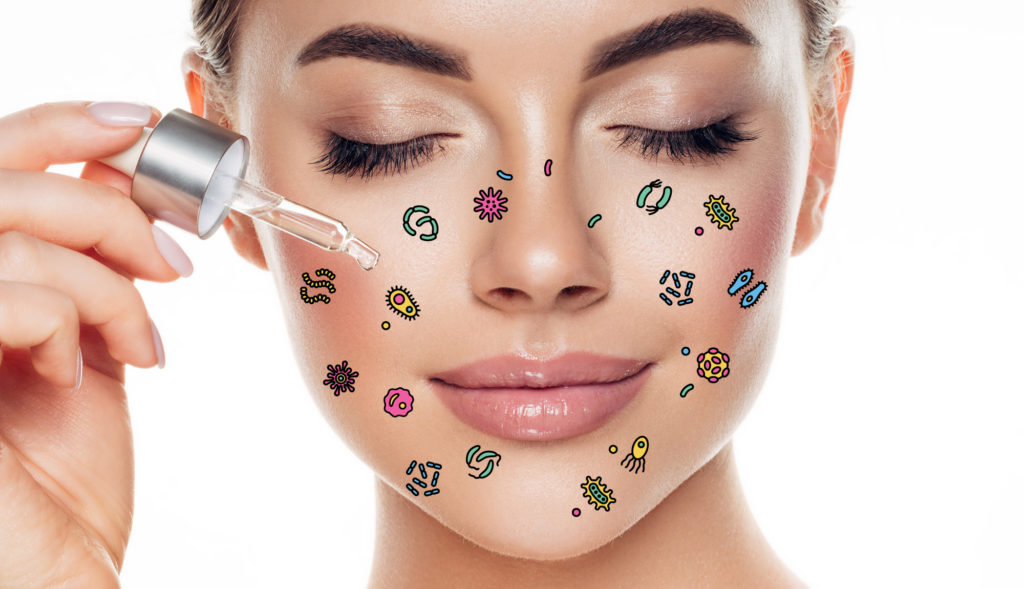It’s a whole community of organisms! You’ve probably heard of the gut microbiome, but you may not know you have a skin microbiome, too. Like the flood of research on the gut microbiome, new research on the skin microbiome is discovering how to monitor and manage these microbes for our benefit — maybe even to prevent and treat skin cancer.
“We can’t think of the skin as just us,” says Richard Gallo, MD, PhD, distinguished professor and founding chair of the Department of Dermatology at the University of California, San Diego. “Human cells that exist in the skin have evolved to either cooperate with or fight the microbial cells — such as the bacteria, viruses and fungi that interact with the skin cells.”

Richard Gallo, MD, PhD, and his colleagues have studied how adding a specific bacterium to the skin can reduce inflammation and another type might even kill cancer cells.
All of those microbial cells — tiny living things that can only be seen with a microscope — interact to make up the skin microbiome. The skin microbiome interacts with your cells and can affect your health in many ways, good and bad.
When all your cells and microbes are happily in balance, you feel healthy. Scientists call that homeostasis. “Infectious disease represents the failure of homeostasis,” Dr. Gallo says. “That’s when a microbe that might normally live benignly around us gets out of balance and causes disease.”
Sometimes it’s a virus that disrupts homeostasis. Most research on viruses on the skin, according to Dr. Gallo, has been on their negative effects, including how they contribute to the formation of skin cancers. “For example, the ability of HPV [human papillomavirus] strains to lead to long-term transformation of cells has been known for a long time, he says.
Instead of focusing on the harmful residents, Dr. Gallo has directed his research toward possible healthy ones. “We’ve been focusing on bacteria since there’s more evidence to suggest we may be able to get beneficial aspects from those,” he says.
In 2021, Dr. Gallo and his colleagues published two studies (one in JAMA Dermatology, the other in Nature Medicine) showing that they could successfully reduce skin inflammation in patients with atopic dermatitis (eczema) by transferring a very specific bacterium to the affected skin. Though this is similar, in essence, to probiotics — bacteria supplements you swallow or apply to help balance your microbiome — Dr. Gallo doesn’t love that term. “We like to call this ‘bacterial therapy,’ to reflect more that it is a specific drug designed for a specific purpose,” he explains. “Saying a ‘probiotic approach’ feels a bit vague about what the mechanisms are.”
While treatments for inflammatory conditions may be just a few years away, further down the road is a bacterial therapy for skin cancer. A few years ago, Dr. Gallo’s team discovered that a certain strain of the bacteria Staphylococcus epidermis (S. epidermis) produces a chemical called 6-HAP. They found that 6-HAP could kill cancer cells, and only cancer cells, even when normal cells were present.
Unfortunately, only about 20 percent of humans have bacteria on their skin that naturally produce 6-HAP. “The next step of the project is whether or not we can show that the normal occurrence of the bacteria that makes 6-HAP means decreased development of skin cancer,” Dr. Gallo says. “We have some early observations that suggest that could be true, but it needs to be a huge study to make it a strong case, so it’s going to take a while.”
Alongside that long-term study, Dr. Gallo wants to figure out if there is a way to create a 6-HAP bacterial therapy for humans. His studies on the skin microbiomes of mice have shown promise. While these bacterial therapies would be amazing news for skin cancer prevention and treatment, Dr. Gallo stresses that they will take years of research — and lots of funding.
What You Can Do for Your Skin Microbiome
“We think anything that improves skin health will translate to better monitoring by the immune system and other things we now know about controlling skin cancer,” Dr. Gallo says. “The skin-care cosmetic industry relies on foundational science done by researchers for efficacy, tolerability and low toxicity in their products,” he says. Here’s what you should know:
Based on scientific research, cosmetics companies now offer many products that are labeled “probiotic,” as well as products that contain certain beneficial enzymes and/or peptides, types of proteins human or microbial cells produce.
There’s also evidence that topical products containing retinoids, such as a facial serum, can benefit your immune system through their effects on the skin microbiome.
Some microbes prefer the oilier parts of your face (like your nose), and some prefer the drier parts (like your cheeks). Cosmetics companies are investigating how to target these different “climates” of your skin microbiome so each is in its own proper balance.
You don’t need to worry about washing away the “good bugs” on your skin (or using too much hand sanitizer). “Most of the microbes are protected down in the follicles in your skin,” Dr. Gallo says. “Gentle skin care regimens and even short-term excessive handwashing probably are not damaging the microbiome.”






